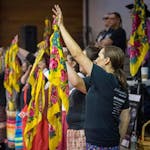On most summer Wednesday nights and Saturday mornings, you'll find Louis Moore at the front of the pack as he rides along the Midtown Greenway and Minneapolis city streets with members of the Major Taylor Bicycling Club.
That's fitting since Moore, a lifelong cyclist, has spent the past 20 years leading the bike club that encourages black residents to get out and ride and advocating for amenities that have helped make Minneapolis one of the top biking cities in the nation.
This summer, the Bicycle Alliance of Minnesota honored Moore with its Lifetime Service Award, an accolade that some say was long overdue.
"Louis has been an ambassador for biking in Minnesota … and doing it without any reward or recognition," said Dacia Durham, a member of the bike club named after Major Taylor, a world champion track cyclist in the late 19th and early 20th centuries.
"It's about time. He's done a lot for the Twin Cities bike community and the black community."
Moore's efforts included persuading Metro Transit to put bike racks on its buses and convincing CEOs of some of the city's largest employers to install biking facilities for commuters on their campuses. As a member of the Minneapolis Bike Advisory Committee and the state Bicycle Advisory Board, he was behind the push to get Minneapolis to put bicycle lanes on its streets.
And when he served as chief of staff for former U.S. congressman Martin Sabo, he was instrumental in getting the Midtown Greenway bike path and the Martin Sabo bridge over Hiawatha Avenue built.
Moore, who at 78 still rides three to four days a week, is most proud of the bike club that he co-founded with Walter Griffin to share his lifelong passion for cycling with others.
Biking "is freedom," Moore said. "It's solitude, time to reflect and enjoy some private time."
More than that, biking is a sport for all ages and a way to stay fit and healthy, something he brought to the black community.
"In the black community, obesity and heart disease are prominent," Moore said. "We sell people on the premise that you need to do something to offset that. We know it is important to do something other than open a can of beer."
The Minneapolis chapter of the bike club is one of about 60 across the United States. Moore started the Minneapolis chapter after Durham and two other black women approached him to help them train for one of the initial Minneapolis-to-Chicago AIDS rides. After the women got back, they wanted to keep riding and suggested they form a bike club for people in the black community.
Moore had just finished reading a book about Marshall Walter "Major" Taylor who, in 1899, became the first black world sprint cycling champion, and he named the group after him.
Naturally, the group started small and, in its early days, raised a few eyebrows. Once on a ride across Minnesota, Moore recalled a group of white riders pulling up beside him and saying, "I thought you guys only played basketball and rap music."
In another case, a Minneapolis police officer saw club members clad in their distinctive bright yellow, red and green jerseys out for a leisurely ride on Park Avenue. The officer stopped to ask if they were a new type of gang.
"That was his reaction to seeing black people on a bicycle," Moore said.
A lot has changed since then. The club now sporting about 70 members is well-known throughout the city. Members often help out at events such as July's Tour de Camden family bike ride through north Minneapolis, and at September's Minneapolis Open Streets on Broadway and the St. Paul Bike Classic.
The club has diversified quite a bit, too. About half of its current members are minority members and half are white. It's also a little gray.
A majority of the club's members are over 50 and seven, including Moore, are over 70. That's a bit worrisome for Moore, who emphasizes that the club is not just for old people. The club's history is featured in a photo exhibit up through Sept. 30 at the Minnesota African-American Heritage Museum and Gallery in north Minneapolis, but without attracting younger riders he says the club will eventually age out.
"It's harder to reach young people," Moore said. "Technology has taken over and it's hard to get them away from the screen. We'd love to have them."
Griffin, too, said the club is for everybody — and he means everybody — from the novice to the high speed racers. The only requirements are to have a bike, helmet and enthusiasm, the club's brochure says.
"There is always somebody who is the slowest rider, and we won't leave you behind," said Griffin, who is constantly recruiting. "That is our promise."
Sometimes club members will just invite people to tag along. That is how Jerry Ciardelli, 71, of St. Louis Park, got involved. A few years ago he was sitting in front of Freewheel Bike Shop in south Minneapolis where the club often begins its Wednesday evening and Saturday morning rides. A club member asked him to ride along and he did.
Weekday and weekend excursions are not just about exercise, although staying healthy and fit is an emphasis. Rides often include stops at churches and other historic sites that tell the stories about the Twin Cities black community. Sometimes they roll along one of the region's myriad trails. There are trips to galleries and museums and street festivals. Dinners at restaurants and potluck gatherings help build camaraderie.
"You don't make a lot of new friends when you get that old," Ciardelli said. "I have a whole new group of friends and I'm getting out to places I don't normally go."
In conjunction with the club's 20th anniversary, biking organizations and the Midtown Greenway Coalition are looking to create a sculpture to pay tribute to Major Taylor, who won his first amateur race at age 13 and was only the second African-American to win a world title in any sport. Planning is in the early stages, said Soren Jensen, executive director of the Midtown Greenway Coalition.
"Major Taylor was an amazing athlete who broke all kinds of barriers," Jensen said. "He was the world's fastest man. He should be known by everybody."
Durham, 56, of Minneapolis, said she is thrilled that Moore is finally getting the attention he deserves.
"He's a lifelong biker, a testament to health and exercise and long living," she said. "He is a role model. We are proud of him."
![Louis Moore has headed the Major Taylor Bicycling Club of Minnesota. ] CARLOS GONZALEZ • cgonzalez@startribune.com – Minneapolis, MN &#x](https://arc.stimg.co/startribunemedia/ZAZSDTH33KAMUMSJXAIRLR7VV4.jpg?fit=crop&crop=faces&w=550&&auto=format)




